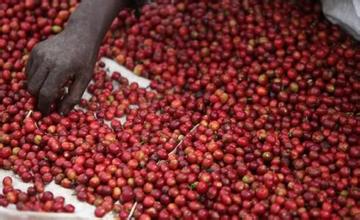Yemeni coffee features Yemeni coffee flavor
Coffee has been Yemen's traditional export product for centuries and remains one of Yemen's most important cash crops and export products. Statistics show that among the top 30 commodities exported by Yemen in 2000, cooked coffee beans, raw coffee beans and coffee shells ranked second, eighth and twenty-first respectively, with a total value of approximately US $17.5 million, of which raw coffee is approximately US $12.25 million. Coffee cultivation area in 1995 2. In 2000, the number of hectares increased from 70,000 to 3,000. Production increased from about 9000 tons in 1995 to about 1,000 tons in 2000. 20,000 tons of coffee per hectare on average 0. 34 tons, coffee production value in 2000 3 billion rials, about 19 million dollars.
Yemen coffee originated from Arabic coffee trees hundreds of years ago, all of which were produced at an altitude of more than 3000 feet. For hundreds of years, the unique planting and production methods of Yemen coffee have almost remained unchanged. The seedlings of coffee trees are first cultivated in nurseries and then transplanted to high altitudes. No pesticides and fertilizers are used in the breeding process. The mature coffee beans are naturally air-dried on coffee trees, shelled by stone mills and then manually selected and washed repeatedly. The coffee beans obtained are regular in shape and uniform in size. Colors range from light green to tan, and the aroma is rich and long-lasting. The quality coffee made, whether drunk alone or mixed, is interesting and refreshing, giving people an endless aftertaste.
Moha is a small seaport on the Red Sea in southern Yemen. Most of the famous Yemeni coffee has been exported to countries all over the world through this place for hundreds of years. Therefore, Yemeni coffee has gradually been named Moha. For many years, Yemen Moha coffee has been regarded as the best coffee in the world, and its excellent quality has always been praised by the world. Mocha coffee was first exported to Europe, and then gradually became popular in neighboring countries. It is said that Saudi Arabia especially likes Yemeni mocha coffee. Even if it is of slightly inferior quality, Saudis are willing to pay a high price for it. Now, almost all coffee exported from Arabia and even India is named mocha. In fact, Yemen is the real origin of the world-famous mocha coffee.
Yemeni coffee has many varieties, mostly named according to its origin and type, with different flavors, such as fresh wood, tobacco, musk, fruit wine, roasted nuts, cocoa and warm seasonings. Moha coffee is especially so. At present, Yemen moha coffee is most famous in the market, such as Ismaili, Matari, Sanani and other varieties. Sanani coffee beans are medium in size and have fruit wine flavor, produced in Sanaa and surrounding areas. Matari coffee originated from the Matar region in the west of Sanaa and its surrounding areas, is the most well-known moha coffee, unique flavor, coffee beans have chocolate color, grain integrity, can have fruit wine and seasoning flavor; Ismaili coffee is the rarest variety of moha coffee, produced in Yemen's highest altitude area, production is very limited, expensive, can have fruit wine, spices, nuts, malt and other flavors, quality in matari and Sanani coffee above, is the world's best coffee. In addition, Xi Laqi and Zamarni are also well-known coffee brands, produced in the high mountains and Zamar areas along the road from Sanaa to Hodeida respectively.
Yemeni moha coffee beans are small and heavy, which is an important feature that distinguishes them from Caribbean and Ethiopian coffee.
In recent years, due to the deterioration of natural conditions and man-made reasons, such as water shortage and the occupation of Carter planting resources, Yemen coffee industry has developed slowly. How to further consolidate and develop coffee planting industry and rebuild Yemen coffee's glory in history is an important issue facing Yemen's agricultural development.

Important Notice :
前街咖啡 FrontStreet Coffee has moved to new addredd:
FrontStreet Coffee Address: 315,Donghua East Road,GuangZhou
Tel:020 38364473
- Prev

Sugar cane juice Red Wine Fruit Acid Kenyan Jinchu Coffee Flavor, characteristics, taste and Manor introduction
Enbu processing Plant (Embu Washing Station), which comes from Gichugu, adopts Kenyan double washing method and grows in Manyata-Enbu County on the eastern slope of the Kenyan Mountains from 1550 to 1750. The variety is Kenya's classic SL28,SL34, coupled with the large temperature difference between day and night in the deceived area, and the red phosphoric acid soil in Kenya, which makes the sour and sweet become the second order of this Kenyan branch.
- Next

Yunnan Coffee Flavor
The western and southern parts of Yunnan Province are located between the 15th latitude and the Tropic of Cancer. Most areas are 1000-2000 meters above sea level. The topography is dominated by mountains and slopes. Here, the land is fertile, the sunshine is sufficient, the rainfall is abundant, and the temperature difference between day and night is large. The unique natural conditions form the special taste of Yunnan small-grain coffee, which is rich but not bitter, fragrant but not strong, slightly fruity. Pu'er in the south and west of Yunnan
Related
- Detailed explanation of Jadeite planting Land in Panamanian Jadeite Manor introduction to the grading system of Jadeite competitive bidding, Red bid, Green bid and Rose Summer
- Story of Coffee planting in Brenka region of Costa Rica Stonehenge Manor anaerobic heavy honey treatment of flavor mouth
- What's on the barrel of Blue Mountain Coffee beans?
- Can American coffee also pull flowers? How to use hot American style to pull out a good-looking pattern?
- Can you make a cold extract with coffee beans? What is the right proportion for cold-extracted coffee formula?
- Indonesian PWN Gold Mandrine Coffee Origin Features Flavor How to Chong? Mandolin coffee is American.
- A brief introduction to the flavor characteristics of Brazilian yellow bourbon coffee beans
- What is the effect of different water quality on the flavor of cold-extracted coffee? What kind of water is best for brewing coffee?
- Why do you think of Rose Summer whenever you mention Panamanian coffee?
- Introduction to the characteristics of authentic blue mountain coffee bean producing areas? What is the CIB Coffee Authority in Jamaica?

